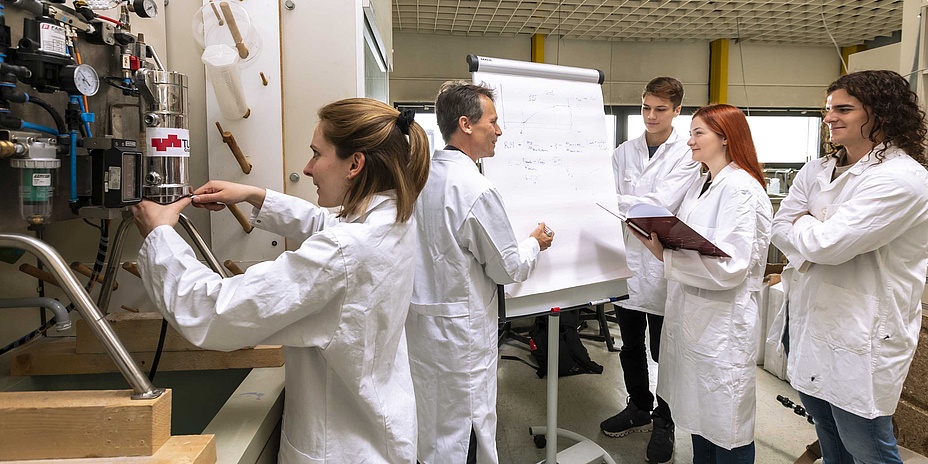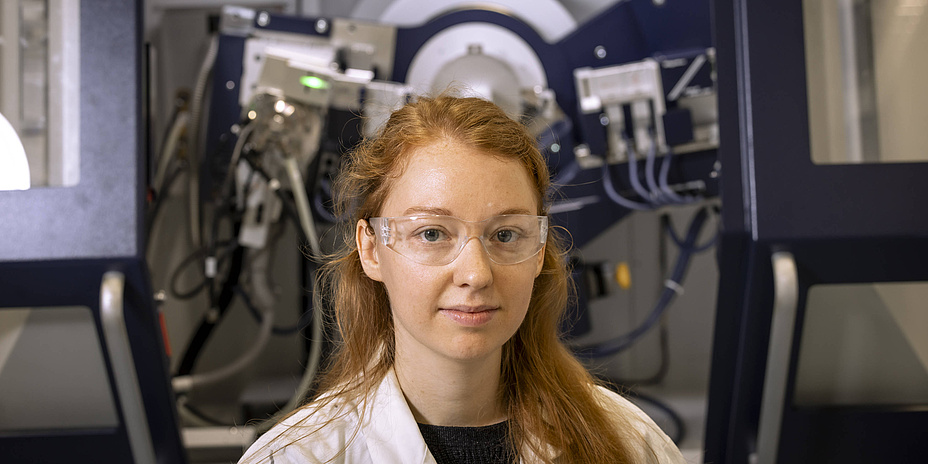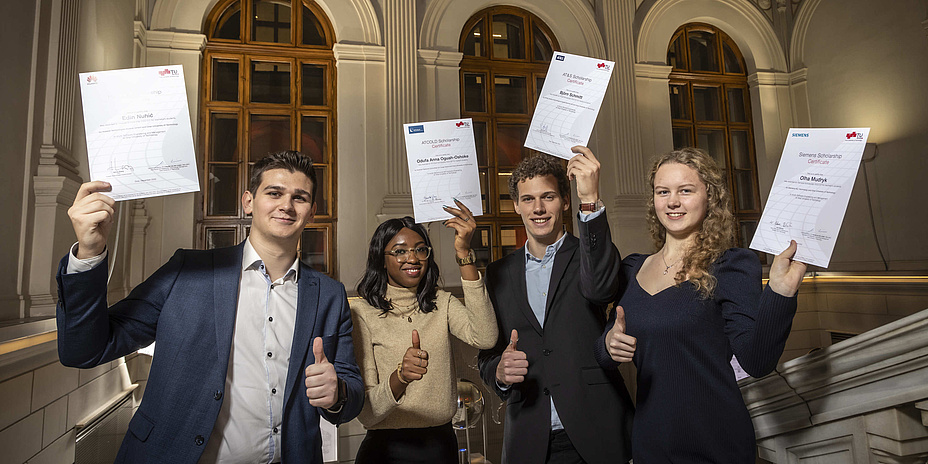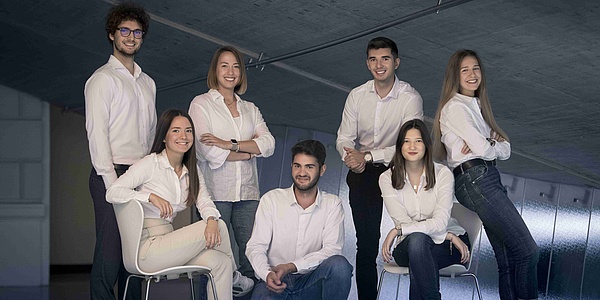Whether your passion lies in engineering, computer science, or groundbreaking scientific research, Graz University of Technology (TU Graz) provides the skills, resources, and opportunities to ignite your potential and shape your future. With its state-of-the-art facilities, interdisciplinary collaboration, and a focus on practical learning, TU Graz ensures that you graduate with both knowledge and real-world experience.
Language of study
While there is a significant range of MSc programmes taught in English, all BSc programmes at TU Graz are taught in German. To enrol in a BSc degree programme, you must demonstrate German proficiency at level C1. If your German skills are below C1, you can still register as a non-degree student with A2 level proficiency. Upon arriving in Graz, you can attend German language courses and preparatory programmes until you achieve the required C1 level to enrol as regular student. You can find more information on the TU Graz website: Proof of German Language Competence.

Bachelor of Science (BSc) programmes
Let’s start our journey with an overview of the 21 BSc programmes offered at TU Graz.
-
Architecture
For those passionate about designing innovative spaces. The BSc programme in Architecture at TU Graz equips you with the skills and knowledge to design not only objects and spaces but also future cities. -
Civil Engineering Sciences and Construction Management
Are you driven to create and manage the essential infrastructure that shapes our world? This may be the perfect BSc programme for you, giving you a strong foundation in mathematics, physic, computer science and many other relevant fields. -
Biomedical Engineering
Who would have thought that medicine and technology could be so interconnected? They are at TU Graz: in the BSc programme in Biomedical Engineering. This unique programme combines engineering, natural sciences, and medical knowledge, providing you with a comprehensive education in both fields. -
Digital Engineering
The BSc programme in Digital Engineering at TU Graz offers an interdisciplinary education that bridges electrical engineering, mechanical engineering, and computer science. Here you will learn to understand, design, and develop complex systems, and address challenges in areas such as mobility, energy supply, logistics, and robotics. -
Electrical and Electronics Engineering
The BSc programme in Electrical and Electronics Engineering delves into fascinating questions about the technologies around us, equipping you to shape the technologies of tomorrow. You can specialize in areas such as electronic systems or sustainable energy systems, and develop the skills needed to innovate in fields like energy technology, automation, and aerospace. -
Electrical and Audio Engineering
For those captivated by the acoustic design of spaces or the seamless interaction between humans and machines. The BSc programme in Electrical and Audio Engineering equips students to shape the future where technology and art converge. -
Geodesy
Our planet is amazing. If you are eager to explore its intricate systems, in the BSc programme in Geodesy you can learn how to collect, understand and use geodata, observe climate change, understand GPS technology and so much more. -
Computer Science
This BSc programme offers a comprehensive education and understanding of computer technologies, preparing students for the dynamic field of information technologies. Students build a strong foundation in computer science and mathematics and also develop practical skills in programming and software development. -
Information and Computer Engineering
For those who cannot decide between computer science and electrical engineering, or would like to take on both fields, Information and Computer Engineering is the perfect solution. Here you get the option to engage in hands-on projects where you create operating systems and develop embedded microcontrollers, while exploring advanced topics like the Internet of Things and Industry 4.0. With Information and Computer Engineering you will be ready to drive technological advancements and shape the future. -
Mechanical Engineering
The BSc programme in Mechanical Engineering offers a solid foundation in essential technical disciplines such as thermodynamics, fluid mechanics, and machine dynamics. Here you can engage with advanced production technologies, materials science, and design processes. It has a big emphasis on practical experience through access to high-quality engine test benches and specialized hydraulic and thermal facilities. -
Software Engineering and Management
The BSc programme in Software Engineering and Management seamlessly integrates software development with business. It offers a dual focus that prepares students to not only create robust software systems but also to lead and manage technology-driven projects effectively. -
Chemical and Process Engineering
BSc Chemical and Process Engineering teaches you the skills to transform raw materials into valuable products. You can gain a solid foundation in chemistry, physics, mathematics, and engineering principles. Hands-on experience with advanced laboratory and technical facilities allows you to apply theoretical knowledge to real-world challenges, from converting waste into energy to developing biodiesel from rapeseed. -
Mechanical Engineering and Business Economics
A unique blend of technical expertise and economic insight. This interdisciplinary programme equips you to develop innovative solutions for complex challenges, combining foundational knowledge in mechanical engineering with essential business management skills. You can gain a solid understanding of materials, manufacturing processes, and construction management, while also learning project planning and cost management.

NAWI Graz
NAWI Graz is a unique research and teaching collaboration between TU Graz and the University of Graz in the natural sciences. NAWI Graz offers joint BSc and MSc programmes as well as a joint doctoral programme – all in all a comprehensive and interdisciplinary education to around 5,000 students. Here is a list of bachelor's degrees offered within the NAWI Graz collaboration:
-
Chemistry
If you want to understand the chemical makeup of the world around you, this may be the perfect degree. It offers you the opportunity to explore diverse applications, from pharmaceuticals to biofuels. Through the cooperation of TU Graz and University of Graz, this unique programme provides a solid foundation in chemistry, physics, and mathematics, while also highlighting the connections between these disciplines and fields like biology, biotechnology, and materials science. -
Environmental Systems Sciences / Natural Sciences-Technology
The BSc programme in Environmental Systems Sciences / Natural Sciences-Technology provides a comprehensive education in chemistry, physics, and earth sciences to address pressing environmental challenges. Students learn to analyse complex human-environment systems and develop sustainable solutions. -
Geosciences
The BSc programme in Geosciences offers an in-depth exploration of our planet's evolution over 4.5 billion years. It also provides a robust foundation in chemistry, physics, mathematics, and biology, enabling you to understand the Earth's structure and the formation of minerals and rocks. -
Mathematics
The BSc programme in Mathematics delivers a comprehensive education in key mathematical areas such as analysis, linear algebra, probability, statistics, and optimisation. Areas of focus include Applied Mathematics, Data Science, Discrete Mathematics, Financial Mathematics, or Technical Mathematics. -
Molecular Biology
Combining biology and chemistry this BSc programme provides an in-depth exploration of the fundamental building blocks of life. It gives you a solid foundation in chemistry, biochemistry, microbiology, and cell biology, with a strong emphasis on genetics and molecular biology. Molecular Biology equips you to understand and innovate within the dynamic field of molecular sciences. -
Physics
Delve into the mysteries of the universe. This BSc programme combines theoretical studies with hands-on experimental work, and also covers essential areas like mechanics, thermodynamics, electromagnetism, and quantum mechanics. This programme equips you with the knowledge and skills to tackle challenging questions and make meaningful contributions to the world of science.
Teacher Education Programmes at TU Graz
TU Graz also offers Teacher Training Courses for Secondary Education: two specialized teacher education programmes in Computer Science and Digital Education and Descriptive Geometry. Both programmes are taught in German and lead to a Bachelor of Education (BEd) and a Master of Education (MEd). They include eight semesters for the bachelor’s and four for the master’s degree.
-
Teacher Education Programme: Computer Science and Digital Education
This degree programme equips future educators with a deep understanding of computer science and the skills to teach it effectively. You'll study core areas such as mathematics, hardware, computer networks, and theoretical computer science at TU Graz, while gaining pedagogical expertise at the University College of Teacher Education Styria. -
Teacher Education Programme: Descriptive Geometry
The Teacher Education Programme in Descriptive Geometry combines expertise in geometry and visualization with pedagogical training. At TU Graz, you'll study advanced geometry, CAD tools, and mathematical foundations. At the University College of Teacher Education Styria, you’ll learn to teach and adapt geometry lessons to inspire spatial thinking and problem-solving. Graduates teach descriptive geometry, technical drawing, and CAD at secondary schools, technical colleges, and adult education institutions.
As TU Graz is constantly expanding its range of degree programmes to meet the needs of a rapidly changing professional world, please visit the website Overview Bachelor's Degree Programmes to find all current degree programmes.

Steps for a successful application
Getting admitted to TU Graz is a straightforward process, and consists of only a few steps:
1. Choose Your Programme
The first step is deciding which programme is right for you. Hopefully, the list above helped you make the best choice.
2. Admission Procedure
Some programmes require a specific admission procedure, conducted once a year for the upcoming academic year. At TU Graz, this applies to the following BSc programmes:
- Architecture
- Electrical Engineering and Audio Engineering
- Molecular Biology
- Teacher Training Courses for Secondary Education
Details about the procedure, including timelines and requirements, can be found here: Overview: Admission Procedure
3. Online Pre-Registration
If you have decided to study a degree programme that does not require an admission procedure, you can go directly to “Online Pre-Registration Procedure”. Only then can you enrol in the degree programme. Please read the instructions for pre-registration.
4. Check the requirements!
- Documents for Austrian Students: Required Documents for Students with an Austrian Sceondary School Leaving Certificate
- Documents for International Applicants: Gather all the required documents for your application (Required Documents for International Applicants)
- Translations: Have your documents translated into German if necessary. Guidelines for this can be found on the website: Translation and Certification of Documents
- International student application deadlines: Be aware of the application deadlines:
- Winter semester: 1 May to 15 August
- Summer semester: 1 December to 15 January
More details about the admission periods and deadlines for all students can be found here: Admission Periods.
5. Prepare and send your application
As an international student applicant, you have two options:
- Send the complete application with all the documents within the deadline by post or bring it in person to:
Technische Universität Graz, Registrar's Office, Rechbauerstraße 12, A-8010 Graz or - hand it in to the porter in Rechbauerstraße 12, addressed to the Registrar's Office.
Please keep in mind that applications must arrive before the respective deadlines. You can find all the information on the website Admission of International Degree Programme Applicants.
If you have an Austrian Secondary School Leaving Certificate, you have to come in person to the Registrar's Office of TU Graz at Rechbauerstraße 12 during the enrolment period – and don't forget to bring the required documents with you. If you meet all the requirements, you will be admitted directly to the programme of your choice. You can find more information under Admission in person at the Registrar's Office on the TU Graz website.
6. Wait
Congratulations on completing all the steps for a successful application! Once your application has been submitted, the Registrar’s Office will review your application and notify you of the decision.

What to Do While Waiting for Your University Admission?
While you wait for your admission decision as an international student applicant or for your confirmation email as a domestic student, take this time to explore opportunities and resources that can help you prepare for student life. Here are some ideas:
- Checklist for getting started
Make your start at TU Graz seamless with the Checklist for New Students. This guide covers everything you need to know, from finalizing enrolment to preparing for your courses and exploring orientation events. It’s your go-to resource for a smooth transition into university life. If you have more questions about starting your studies as an international at TU Graz, the FAQ for International Students has all the answers you need. If you are a national prospective student, visit the FAQ for Prospective Students. - Scholarships and Financial Support
While awaiting your admission decision, this is an ideal time to explore scholarship opportunities. One notable programme is the TU Graz 100 scholarships, a collaboration with national and international companies, designed to support young talents. You can read more about it on the website Scholarships: TU Graz 100
There is also the very detailed blog post Scholarships and Grants for National and International Students that can help you understand and apply for different scholarships. - Welcome Days
The Welcome Days for all freshers, which are held in German, will help you to make a successful start to your studies. For details visit the Welcome Days website. - International Welcome Days
The International Welcome Days will help to ease your transition into life at TU Graz and in Austria. This multi-day event welcomes new students and gives them an introduction on how to successfully start their studies at TU Graz. So it is definitely worth a visit. Find more information and some very useful videos on the International Welcome Days website. - Student Ambassador Stories
International student ambassadors of TU Graz write about topics that matter to new and future students, and they also provide some very useful information. From practical tips to personal experiences, their blog posts are filled with valuable information and tricks to help you settle in. Find an overview of all the posts on the Student Ambassador Stories website.
![[Translate to Englisch:] [Translate to Englisch:]](https://www.tugraz.at/fileadmin/_processed_/5/f/csm_Bachelorstudien-by-lunghammer-tugraz_e49782cedf.jpg)



![[Translate to Englisch:]](https://www.tugraz.at/fileadmin/_processed_/5/f/csm_Bachelorstudien-by-lunghammer-tugraz_25c6f7a909.jpg)
